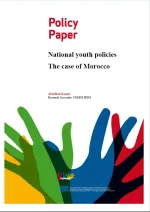SAHWA Papers. National Youth Policies. The Case of Morocco

SAHWA Policy Paper nº. 14
ISSN 2564-9167
Early drop-out from the education system is one of the major hindrances to the development of human capital in Morocco. A large proportion of young people leave the education system without any qualification. Particularly high levels of youth unemployment and precarious working conditions have contributed to youth poverty and social exclusion, inhibiting young people’s autonomy and impeding their personal development and general well-being. According to SAHWA Survey data, 39% of young people aged 15 to 29 are on the labour market (40% of them are employed and 60% unemployed). 35.4% of young people without a job are also disengaged from the education system. Youth employment is characterised by a high levels of precariousness and great fragility. The family continues to play a central role and is often a substitute for public policies, notably in terms of housing (most young people still live in the family home), finding work and funding projects, etc.
In the face of such challenges, various policies have been adopted to address youth issue. The primary goal of this policy paper is therefore to present the current state of youth policies in Morocco in order to subsequently observe the way these policies can contribute to improving young people’s situation by drawing lessons from their effectiveness and the challenges to be faced.
In terms of youth policies, Morocco is seeking to move on from the approaches that prevailed until now, which centred principally on the issues of graduate inclusion and formal private employment, in order to target young people as a group as well as their social conditions. If the ambition is high, the measures taken must remedy the general deficit shown in terms of education, qualification and employment.
These days, young people’s place in public policy, for their inclusion and social protection, ranks as a priority. The new constitution adopted in 2011 laid the foundations for the institutionalisation of the youth related issues. The new National Employment Strategy 2015-2025, the National Strategy for Vocational Training 2021 and the National Integrated Youth Policy 2015-2030 are initiatives based on a global focus that aims to grasp the set of problems young people face and understand the complexity of their contemporary reality and the issues that relate to them.
Among the targets set, greater involvement of young people in the conception of public policies is sought, along with a reduction in inequalities and the economic and social inclusion of all young people in Morocco so that they can benefit from the same opportunities.
The effectiveness of the new national strategy is dependent on the involvement of young people not only in the development of policies, but in their implementation and follow-up so that the programmes envisaged have a real impact on their conditions. It must also lead to a decentralisation of these provisions so that they are entirely appropriated by local authorities. They are able to mobilise actors, associations and enterprises at local level and translate the strategic guidelines into instruments that genuinely guide young people towards professional inclusion and the realisation of their projects.